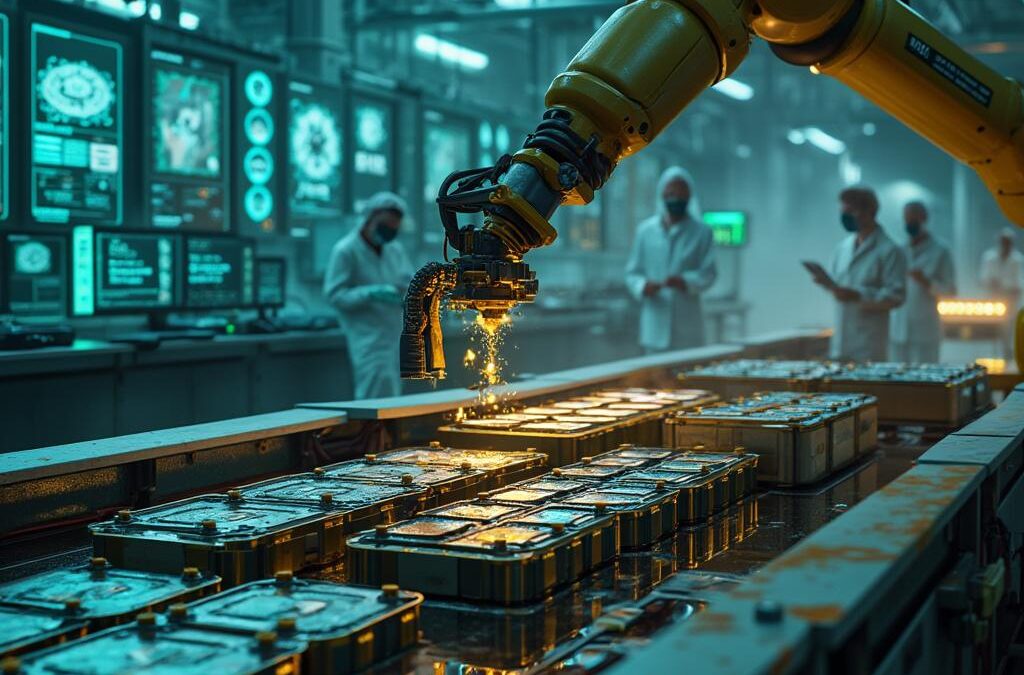The global push toward cleaner energy and electric vehicles has sparked a surge in battery demand, but it also raises critical questions about sustainability. As the world transitions away from fossil fuels, the environmental and ethical challenges of mining raw materials for batteries—such as lithium, cobalt, and nickel—have come under intense scrutiny. Meanwhile, the sheer volume of end-of-life batteries, particularly lithium-ion, poses a growing waste management crisis.
Enter a wave of innovative startups determined to crack the code on battery recycling. These companies are pioneering cutting-edge technologies to recover valuable materials from used batteries, reducing the need for virgin mining and closing the sustainability loop in the battery lifecycle. By addressing both environmental and economic challenges, they are reshaping how batteries are managed after use.
From advanced sorting systems to closed-loop recycling processes, these startups are proving that battery waste can be transformed into a valuable resource. Their work not only supports the transition to renewable energy but also aligns with the principles of a circular economy, where materials are reused and recycled rather than discarded.
Leading the charge are companies like Cactos, Suzhou Botree Cycling Sci & Tech, Battery Resourcers, Redwood Materials, and Ruicycle. Each brings unique innovations to the table, from repurposing electric vehicle batteries to reclaiming over 95% of valuable metals. Together, they are paving the way for a more sustainable future—one where batteries are treated as resources, not waste.
These companies employ cutting-edge techniques such as direct cathode recycling, hydrothermal processing, automated disassembly, closed-loop electrolyte recovery, ultrasonic separation, AI-driven sorting to extract lithium, and selective electrodeposition. The goal is to recover valuable metals like lithium, cobalt, nickel, and copper efficiently and sustainably, reducing dependence on virgin mining and mitigating environmental impacts.
Key Startups and Their Contributions
– Cactos (Finland) develops distributed energy storage systems using recycled electric vehicle (EV) batteries, particularly re-used Tesla batteries. Their energy storage units stand out as among the most environmentally friendly in the market, supported by €35.5 million in funding. By repurposing EV batteries, Cactos extends battery life and reduces waste.
– Suzhou Botree Cycling Sci & Tech (China) offers solutions focusing on recycling critical battery materials. Backed by CN¥100 million in funding, this company is part of the growing Chinese battery recycling ecosystem targeting improved material recovery from spent batteries.
– Battery Resourcers (USA) aims to create sustainable closed-loop recycling within the lithium-ion battery industry. Their processes strive to recover materials at high efficiency to feed back into new battery production.
– Redwood Materials (USA) uses a novel approach to reclaim over 95% of valuable metals from end-of-life batteries, including nickel, cobalt, and copper. The recovered materials are repurposed into battery components such as anode copper foil and cathode active materials. Redwood has established battery collection programs in partnership with automotive companies like Ford and Volvo, facilitating a circular lifecycle for EV batteries.
– Ruicycle (China) focuses on a circular economy approach by reducing, reusing, and recycling waste materials including plastics, e-waste, and batteries. Their modern facilities incorporate advanced sorting and processing technologies aimed at maximizing resource recovery while minimizing landfill reliance and greenhouse gas emissions. This contributes to environmentally friendly sustainability in battery material recovery.
Collectively, these startups demonstrate innovative advances in battery recycling that could transform how batteries are managed after use, enabling a more circular economy. By efficiently recovering critical metals and reusing them in new battery production or energy storage solutions, these companies are addressing the environmental challenges associated with battery disposal and raw material extraction. This wave of innovation supports the global transition to cleaner energy by ensuring that battery materials are valuable, recyclable resources rather than waste.
Conclusion
The rise of innovative battery recycling startups represents a pivotal moment in the global transition to cleaner energy. As the demand for electric vehicles and renewable energy storage grows, so too does the need for sustainable solutions to manage battery waste. These companies are at the forefront of addressing the environmental and ethical challenges posed by mining and disposal, offering cutting-edge technologies that transform waste into valuable resources.
By pioneering advanced recycling methods, startups like Cactos, Redwood Materials, and others are not only reducing the strain on natural resources but also aligning with the principles of a circular economy. Their work ensures that materials like lithium, cobalt, and nickel are reused, minimizing the need for virgin mining and lowering the carbon footprint of battery production.
As these startups continue to innovate and scale, they pave the way for a future where batteries are seen as renewable resources rather than disposable commodities. Their contributions are essential to achieving a sustainable energy landscape, proving that environmental responsibility and economic growth can go hand in hand.
Frequently Asked Questions
Why is battery recycling important for sustainability?
Battery recycling is crucial as it reduces the need for mining raw materials, lowers greenhouse gas emissions, and minimizes toxic waste. It supports a circular economy by reusing valuable metals like lithium and cobalt.
What materials do battery recycling startups recover?
Startups recover critical materials such as lithium, cobalt, nickel, and copper. These metals are essential for manufacturing new batteries, reducing reliance on virgin mining.
Can you name some leading battery recycling startups?
Prominent startups include Cactos, Suzhou Botree Cycling Sci & Tech, Battery Resourcers, Redwood Materials, and Ruicycle. Each offers unique innovations in recycling technologies.
What challenges do battery recycling startups face?
Challenges include developing cost-effective technologies, ensuring safe processing of hazardous materials, and scaling operations to meet growing demand.
How do these startups impact the future of energy?
By enabling the reuse of battery materials, these startups support renewable energy adoption and reduce environmental impacts, making electric vehicles and energy storage more sustainable.

